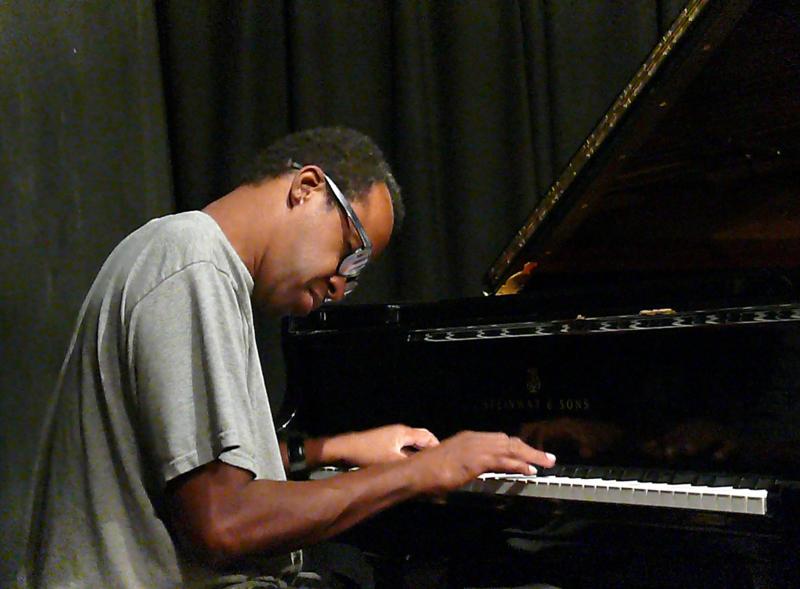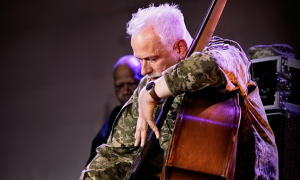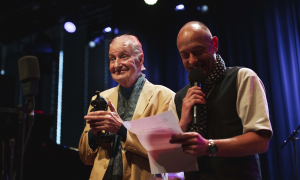Home » Jazz Articles » Profile » David S. Ware and the Wisdom of Uncertainty
David S. Ware and the Wisdom of Uncertainty

Ware's music could be understood as a map towards the unknown landscape of human emotions, trying to recognize and redeem them. In terms of emotion, some sounds are flat, but Ware's music is multidimensional.

David S. Ware
saxophone, tenor1949 - 2012
The name of the label is inspired by

Charles Mingus
bass, acoustic1922 - 1979
Some of the most important names on the label include Ware and fellow saxophonist

Darius Jones
saxophone, alto
William Parker
bassb.1952

Joe Morris
bass, acousticb.1955

Mike Pride
drumsCooper Moore
piano
Matthew Shipp
pianob.1960

Eri Yamamoto
piano
Ware, Parker and Shipp form a super group with percussion wizard

Susie Ibarra
percussionb.1970
"Acclimation" starts full throttle with the whole group in motion as Ware bursts out with soulful playing, stating the theme with his throaty voice. As he slurs the saxophone lines, the piece explodes into a tightly swinging piece with Shipp dancing away on the tangents, keeping things in motion and interrupting them at the same time with crashing piano thunder. All the while, he keeps a close eye on the theme. The amazing thing is how two ages of jazz interact with each other: avant-garde explosions meet sophisticated swing feeling and time signatures are constantly challenged. Around the 11-minute mark, Parker is buzzing away on the bass, making it sing with his bow while Ibarra's percussive sounds are rustling in the background. Suddenly, Ware breaks through with a gigantic howl from the saxophone, stating the theme once again and marking the ending as a continuous circle.

The beginning of "Utopia" is simply heartbreakingly beautiful, a fragile, almost classical melody with Shipp's gentle piano figures in dialogue with Parker's cello-like playing on the bass and the wind chimes of Ibarra. There is an almost baroque playfulness about Shipp's approach before he unfolds the full scope of his instrument, moving from major to minor with dense, dark, rolling chords. This more than three-minute prelude sets the stage for Ware's deep playing, making the earth move with his saxophone, reaching into the human landscape with an utopian love cry that sings the melody. He gradually builds his playing into a frenzy, reaching for a register that is as high as heaven and the climax is replaced by the more hushed sounds of the introduction with Parker's bowed bass and the piano-playing disappearing into the horizon.

"Continuum" is a fitting title for the ending of the album, which is not an ending in the usual sense. It is as if the music moves in circles and ebbs and flow instead of following a straight narrative line. The melodic theme in the beginning finds Ware's saxophone jumping from line to line while Shipp follows suit, but then there is a descent into the maelstrom with splashing waves of sound. Suddenly Shipp emerges clearly with poignant piano figures and Parker's abstract groove in the background while Ibarra adds restless rhythms on the cymbals. All the time, the theme is floating underneath it all and ends the composition.
Free jazz is sometimes accused of not having any form, but Ware's music shows a very advanced sense of form grounded in the repetition of melodic motifs and themes. In Matt Galloway's liner notes, there's a quote where Ware talks about the significance of form:
"I've always been very aware of form. People sometimes say that this type of music is just random notes, that anything goes. That's just not the case at all. There's so much information being passed through this music -musical, philosophical and metaphysical -and the motifs and melodies have their own direction about them."
One way of describing what is going in Ware's music is that he works with an organic concept of form. In the music, there are fragments of other genres, including swing, minimalism and classical, but really it would be wrong to describe a part of the music as a fragment of swing. What the musicians do is that they let the music decide the form, instead of letting the form decide the music. Genres are useful, but they can also be limiting and Ware's music swings if it NEEDS to swing and it stops swinging when it no longer needs to do it. It does not follow the straitjacket of conventional genres. The music is not without form, but is free to develop its own form regardless of genres.

This way of playing requires a special musical compass, a belief in the moment and first and foremost openness. This openness also entails vulnerability and instability, but this is exactly where fixed musical borders start to blur and wisdom can occur. The saxophonist

Pharoah Sanders
saxophone, tenor1940 - 2022
"The intent of the music is for people to listen to what it is I do -whether it's in solo context or group context—and to make them think. To start thinking about things in a non-physical way. My intent is to initiate them. For some kind of initiation to take place in their thought process, in their higher emotions, to influence them to take on higher values, to get into actually living higher values and to take them Self-wards. When I say Self I don't mean individual self, I mean universal, cosmic, all-inclusive self. A Self that's in everyone."
In other words, music is high emotional intelligence, or at least it has the potential to be it, in the right musician's hands, and the right listener's ear. Ware's music could be understood as a map towards the unknown landscape of human emotions, trying to recognize and redeem them. In terms of emotion, some sounds are flat, but Ware's music is multidimensional.
Each human is essentially a mystery, just like life is a mystery. Life, beautiful as it is, is also uncertain, but in the middle of the darkness there is a light. In the middle of chaos, a form arises that was always there. That is the wisdom of uncertainty. Even though David S. Ware is no longer among us. The affirmative message of his music lives on.
Selected records by David S. Ware on AUM Fidelity:
David S. Ware Quartet: Wisdom of Uncertainty (1997)
David S. Ware/Joe Morris/William Parker/Warren Smith: Shakti (2009)
David S. Ware/Cooper-Moore/William Parker/Muhammad Ali: Planetary Unknown (2011)
David S. Ware/William Parker/Warren Smith: Onecept (2010)
Photo Credit: Ziga Koritnik: David S. Ware and William Parker (p. 1); Dave Kaufman: Susie Ibarra (p. 1); John Sharpe: Matthew Shipp (p. 1); Aldon Nielsen: William Parker (p. 2).
Tags
David S. Ware
Profiles
Jakob Baekgaard
United States
New York
New York City
Charles Mingus
Darius Jones
William Parker
Joe Morris
Mike Pride
Cooper Moore
Matthew Shipp
Eri Yamamoto
Susie Ibarra
Pharoah Sanders
Comments
PREVIOUS / NEXT
Support All About Jazz
 All About Jazz has been a pillar of jazz since 1995, championing it as an art form and, more importantly, supporting the musicians who make it. Our enduring commitment has made "AAJ" one of the most culturally important websites of its kind, read by hundreds of thousands of fans, musicians and industry figures every month.
All About Jazz has been a pillar of jazz since 1995, championing it as an art form and, more importantly, supporting the musicians who make it. Our enduring commitment has made "AAJ" one of the most culturally important websites of its kind, read by hundreds of thousands of fans, musicians and industry figures every month.
Go Ad Free!
To maintain our platform while developing new means to foster jazz discovery and connectivity, we need your help. You can become a sustaining member for as little as $20 and in return, we'll immediately hide those pesky ads plus provide access to future articles for a full year. This winning combination vastly improves your AAJ experience and allow us to vigorously build on the pioneering work we first started in 1995. So enjoy an ad-free AAJ experience and help us remain a positive beacon for jazz by making a donation today.

New York City
Concert Guide | Venue Guide | Local Businesses
| More...






 Buy Now
Buy Now























